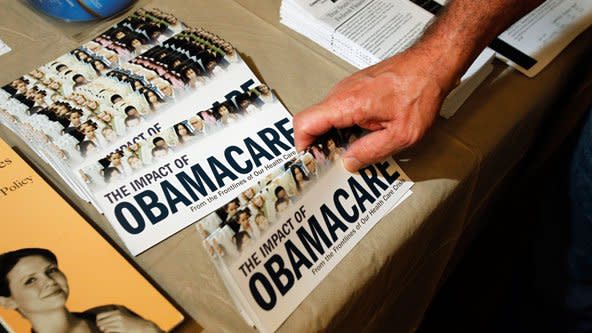The Two Issues That Could Bring Down Obamacare

Today marks the one-year anniversary for Obamacare’s health exchanges—which have helped more than 7 million people across the country enroll in health coverage. And while Obamacare’s marketplace is settling in for its second year, serious issues are cropping up that could potentially derail the entire health care law leaving millions without affordable health coverage.
The first potential problem deals with funding for the law’s crucial risk corridor program, which protects insurers from major losses. Insurers who agree to sell policies on the new exchanges are compensated for if they incur heavy losses during the first few years of Obamacare’s implementation.
Related: Obamacare Risk Corridors Spur Debt Ceiling Showdown
Under this provision, if insurers’ expenses exceed 103 percent of their projected costs, the federal government would be required to reimburse half of those payments. If their actual claims increased 8 percent above the projected claims, the government would cover 80 percent of the excess.
The problem is the law’s vague language does not actually give the Department of Health and Human Services legal authority to fund the program—meaning Congress must get involved. That’s according to a legal opinion released last night by the Government Accountability Office, which said that in order for the Centers for Medicare and Medicaid to use general funds for the risk corridors—Congress must adopt language spelling that out in CMS’s future appropriations.
Though it sounds simple enough, health and political experts worry that this is likely to set up yet another political showdown on Capitol Hill over the funding of the president’s health care law.
Republicans have unsurprisingly expressed staunch opposition to the risk corridor program—with many dubbing it a “bailout for insurance companies.”
Related: 5 Big Challenges for Sylvia Burwell and Obamacare
Sen. Marco Rubio (R-FL) even introduced a bill earlier this year to entirely scrap the program. But now, it seems, lawmakers could do that simply by withholding funding.
If this happens, the government would not be able to pay insurers with higher than anticipated costs—and without that incentive, insurers may decide to leave the marketplace—resulting in less competition and fewer options for consumers.
That’s not all. Obamacare is facing legal challenges that could potentially result in millions of people losing their federal subsidies that they rely on to make health coverage affordable.
At least four federal court cases center around whether the law’s language permits people enrolled in both the state and federal exchanges to receive subsidies. Plaintiffs contend that only enrollees on the state exchanges are eligible.
Just this morning, the Eastern District Court of Oklahoma became the second court to strike down Obamacare’s subsidies on federal exchanges, making it even more likely that the case will eventually go before the Supreme Court.
Though there is still one more District court that hasn’t issued a ruling, many experts believe the case will end up at the Supreme Court. With a ruling against the Obama administration, more than 7.3 million people could be affected, according to an analysis by the Robert Wood Johnson Foundation.
Top Reads from The Fiscal Times:
